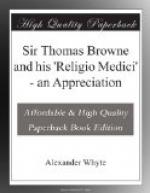of nature and man; of miracles and oracles; of the
Holy Ghost and holy angels; of death; and of heaven
and hell. And, especially, and with great fulness,
and victoriousness, and conclusiveness, he deals with
death. We sometimes amuse ourselves by making
a selection of the two or three books that we would
take with us to prison or to a desert island.
And one dying man here and another there has already
selected and set aside the proper and most suitable
books for his own special deathbed. ‘Read
where I first cast my anchor,’ said John Knox
to his wife, sitting weeping at his bedside.
At which she opened and read in the Gospel of John.
Sir Thomas Browne is neither more nor less than the
very prose-laureate of death. He writes as no
other man has ever written about death. Death
is everywhere in all Sir Thomas Browne’s books.
And yet it may be said of them all, that, like heaven
itself, there is no death there. Death is swallowed
up in Sir Thomas Browne’s defiant faith that
cannot, even in death, get difficulties and impossibilities
enough to exercise itself upon. O death, where
is thy sting to Rutherford, and Bunyan, and Baxter,
and Browne; and to those who diet their imaginations
and their hearts day and night at such heavenly tables!
But, if only to see how great and good men differ,
Spinoza has this proposition and demonstration that
a ’free man thinks of nothing less than of death.’
Browne was a free man, but he thought of nothing
more than of death. He was of Dante’s mind—
The arrow seen beforehand slacks
its flight.
The Religio Medici was Sir Thomas Browne’s
first book, and the Christian Morals was his
last; but the two books are of such affinity to one
another that they will always be thought of together.
Only, the style that was already almost too rich
for our modern taste in the Religio absolutely
cloys and clogs us in the Morals. The
opening and the closing sentences of this posthumous
treatise will better convey a taste of its strength
and sweetness than any estimate or eulogium of mine.
’Tread softly and circumspectly in this funambulatory
track, and narrow path of goodness; pursue virtue
virtuously: leaven not good actions, nor render
virtue disputable. Stain not fair acts with foul
intentions; maim not uprightness by halting concomitances,
nor circumstantially deprave substantial goodness.
Consider whereabout thou art in Cebes’ table,
or that old philosophical pinax of the life of man:
whether thou art yet in the road of uncertainties;
whether thou hast yet entered the narrow gate, got
up the hill and asperous way which leadeth unto the
house of sanity; or taken that purifying potion from
the hand of sincere erudition, which may send thee
clear and pure away unto a virtuous and happy life.’
And having taken his reader up through a virtuous
life, Sir Thomas thus parts with him at its close:
’Lastly, if length of days be thy portion, make
it not thy expectation. Reckon not upon long




